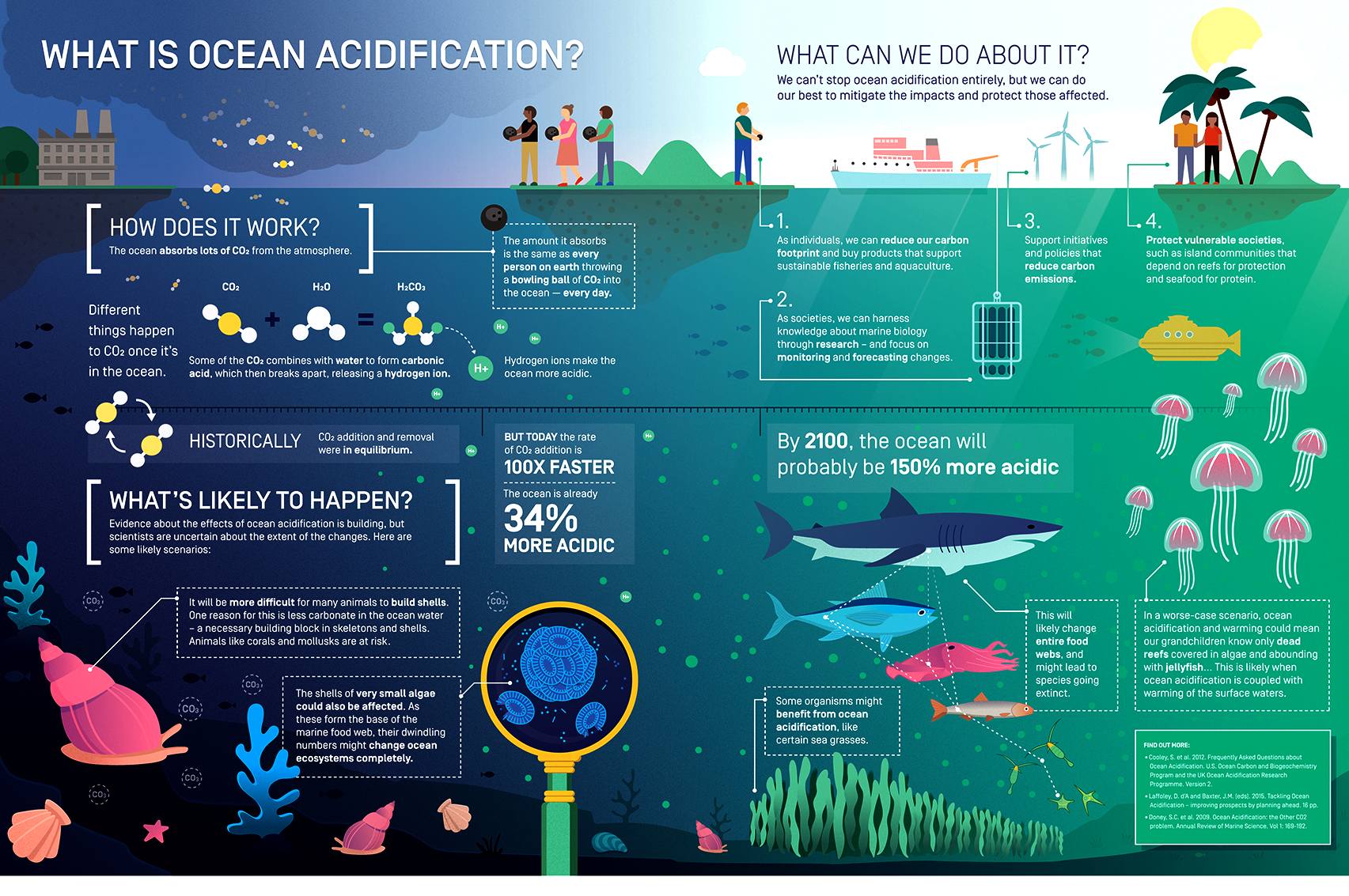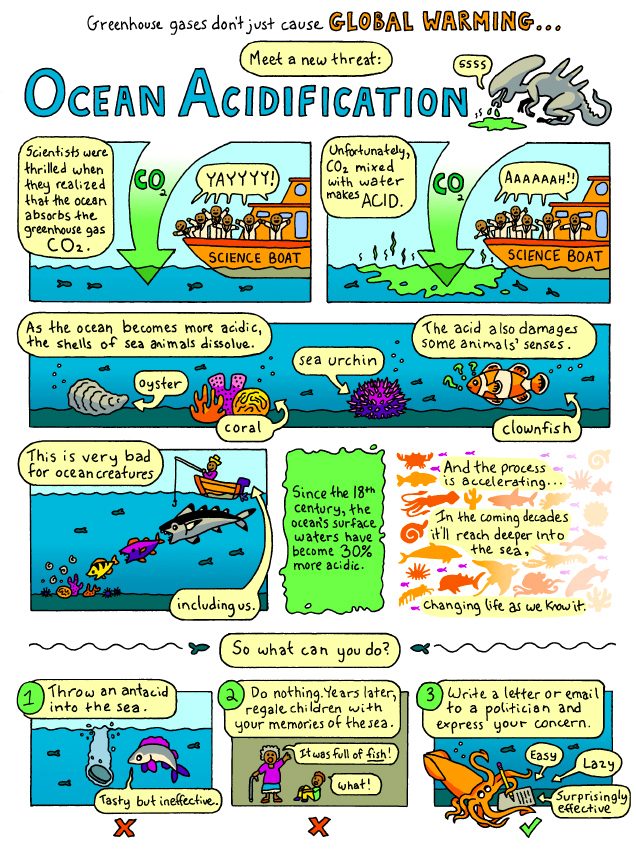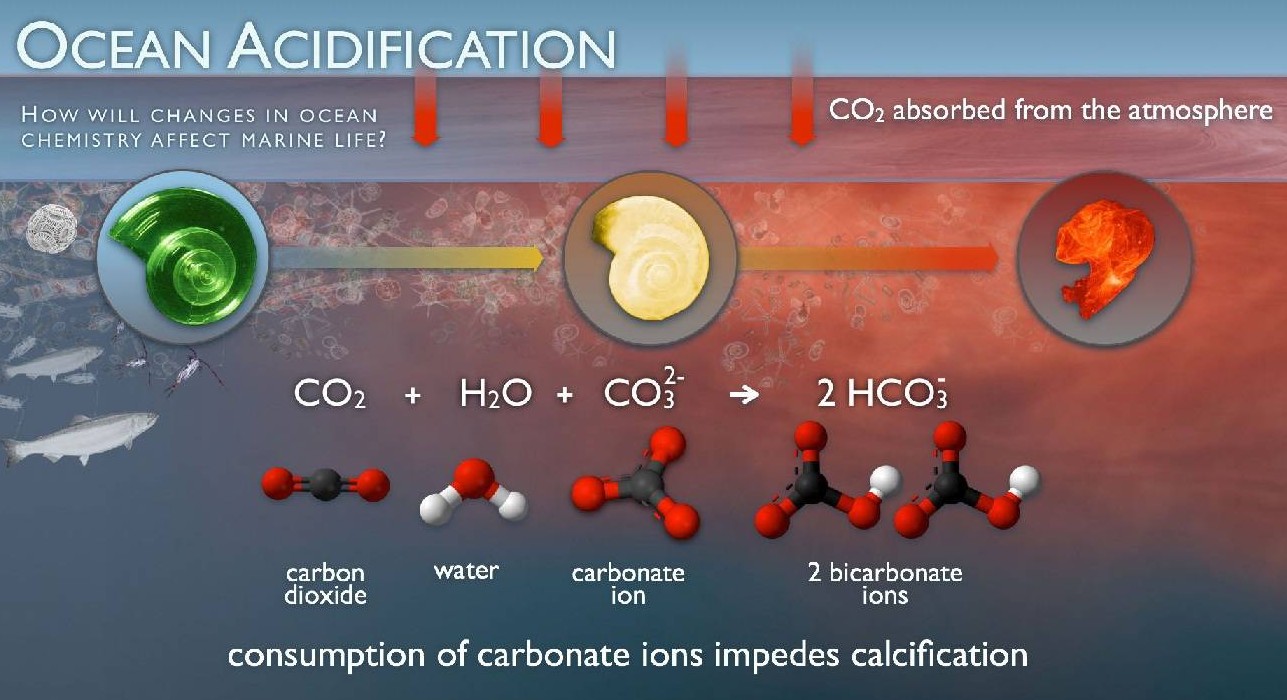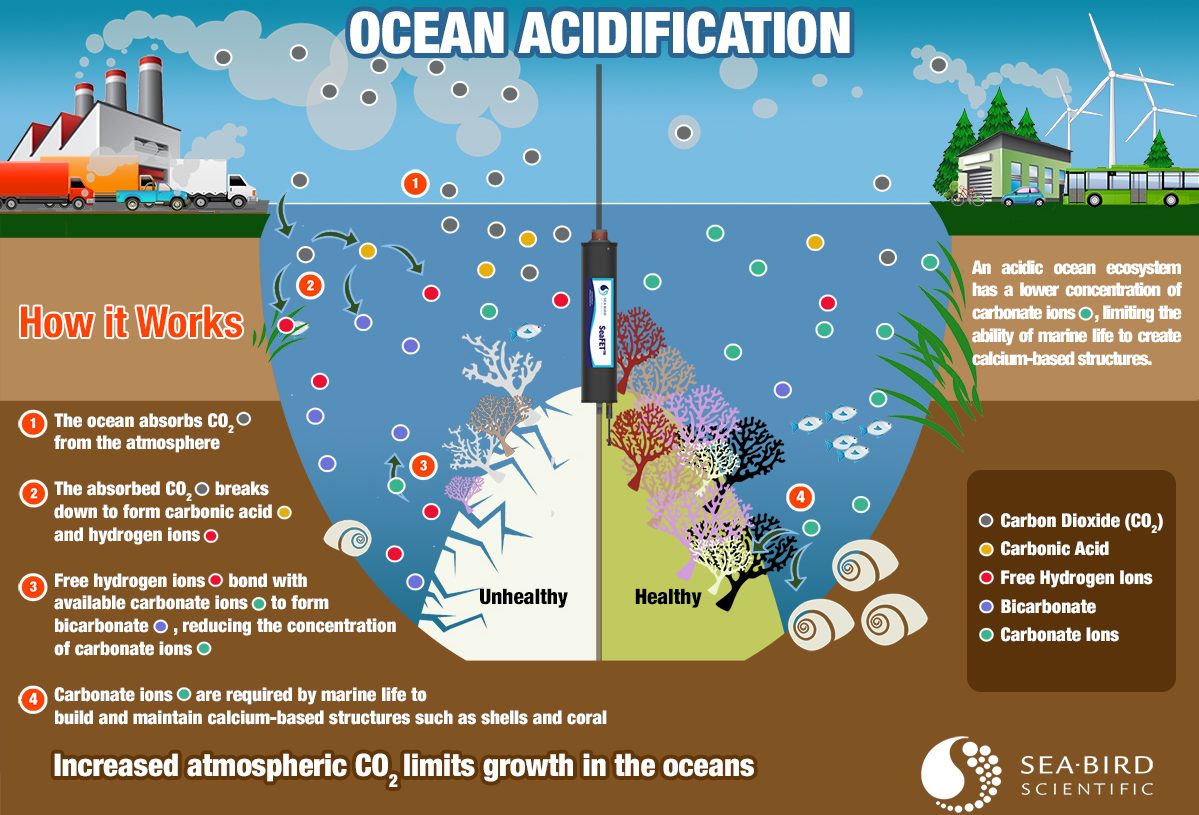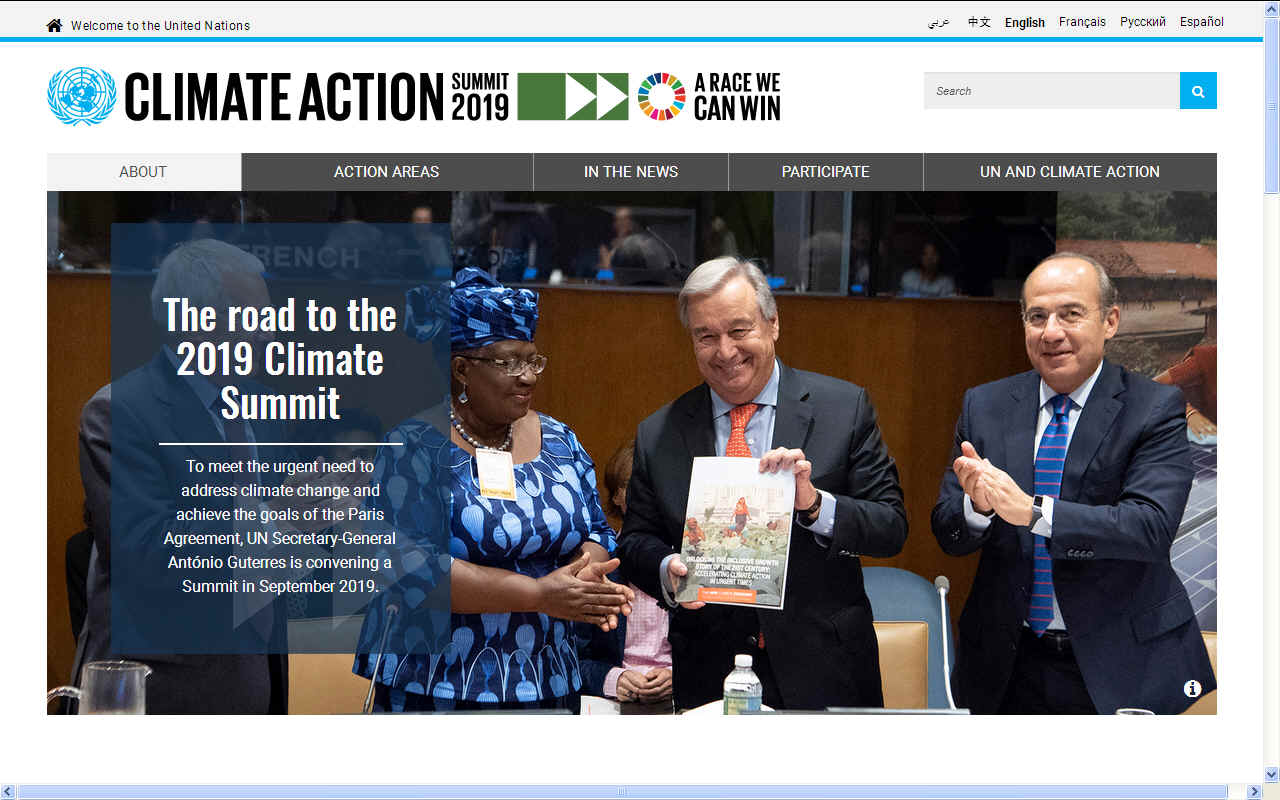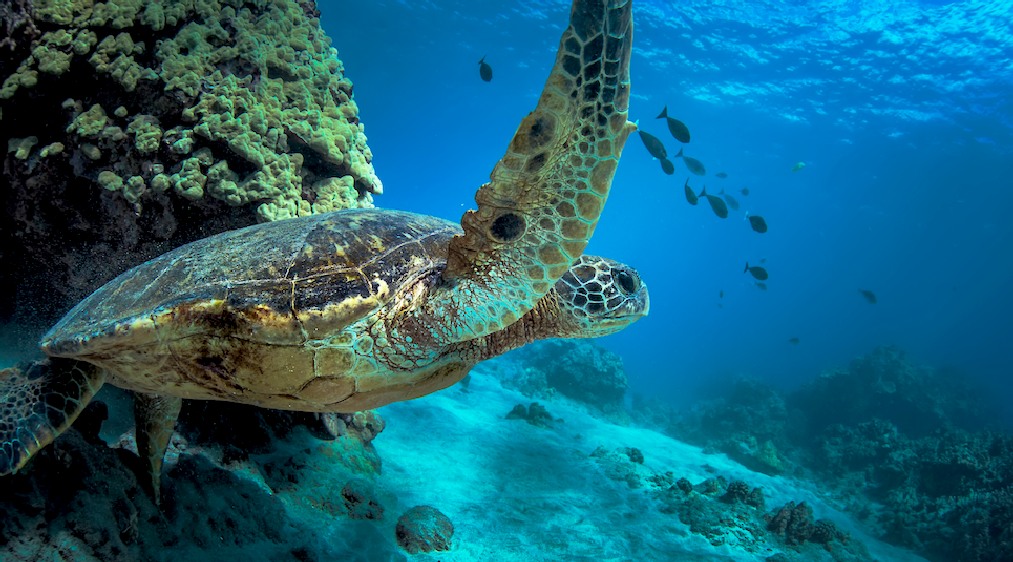|
ACIDIFICATION
Please use our A-Z INDEX to navigate this site |
|||||||||||||||||||||||||||||||||||
OCEAN DEGRADATION - The more acid our oceans, the more marine life diminishes to the point where oxygen creating phytoplankton may no longer produce this life sustaining gas. Ocean degradation includes plastic pollution. Another menace making the seas less life sustaining.
Acidification is such a serious problem that the United Nations has a Climate Convention to seek to combat the problem. They hold annual conferences involving something like 197 parties, known as COPs.
Why and how does ocean acidification happen and why is this important for humans?
About 30% of the carbon dioxide emitted in the atmosphere is absorbed by the global ocean. Once CO2 meets the H2O, we get: 1. carbonic acid H2CO3 and 2. free hydrogen ions H+. These free hydrogen ions H+ will bond with carbonate ions CO3(2-), which is bad, because carbonate ions are essential for the creation of calcium carbonate CaCO3. Calcium carbonate is an essential ingredient for calcium based structures such as shells and coral.
One cause of acid oceans is sulfurous oxides from ships that burn heavy fuel oil called bunker fuel.
Basically too many H+ in the ocean, an effect of CO2 emissions, is stealing all the CO3(2-), which is fundamental to the survival of many marine species.
Average pH of surface waters in 1850 vs its projected value in 2100 if current trends continue; CO2 emissions have increased ocean acidity by 26% since the beginning of the industrial revolution, by 2100 the acidity will have surged by 170%; as a result, many marine species will become extinct.
Around 70% (estimates vary from 50% to 85%) of the oxygen is produced by marine plants. Primarily by phytoplankton.
If ocean acidification continues, many species will suffer drastic consequences (some of them will inevitably become extinct), including phytoplanktons.
Their balance will be greatly disturbed, many phytoplankton species will migrate and maybe adapt to the new conditions, others will probably disappear. This will in turn reduce global oxygen levels and that is bad for every life form that breathes.
Phytoplankton population has dropped by 40% since 1950. Add that to the 8 million tons of plastics entering our oceans and we are in deep doodoo.
WE NEED TO CHANGE - We grow up thinking that our parents and grandparents know what they are doing. They may very well understand the risks they are taking, but on the whole, most people do not understand what is going on until they find out from sites like this and from teachers.
...
CLIMATE CHANGE COP HISTORY
BIODIVERSITY COP HISTORY
DESERTIFICATION COP HISTORY
CREATURES OF HABIT - The United Nations is an organization that is finding it hard to persuade kleptocratic members to change their dirty fossil fuel energy and habits that are sending clouds of greenhouse gases into the air at an alarming rate, causing acid oceans. The reason being that their more prominent members of the UN are the biggest users of fossil fuels, with so much invested in oil and gas production that they cannot give up this source of wealth creation. Their shareholders want their dividends no matter how much it hurts the planet. We don't need to be rich, we need to be safe.
OCEAN RELATED LINKS :-
4OCEAN - BRACELETS MADE OF RECYCLED PLASTIC ACIDIFICATION - ACID OCEANS AEPW - ALLIANCE TO END PLASTIC WASTE AKZO NOBEL - ALGALITA - MARINE RESEARCH & EDUCATION FOUNDATION, CHARLES MOORE ALPLA - PLASTIC PRODUCTS BASF - BEACH CLEANING - OPERATIONS WORLDWIDE BEACHES - TOP 100 COASTAL TOWN IN UNITED KINGDOM BIODIVERSITY - CONVENTION - MOST AT RISK STUDY 2019 BOREALIS - BOROUGE - ABU DHABI POLYMERS BOYAN SLAT - THE OCEAN CLEANUP PROJECT, ENVIRONMENTAL ASSESSMENT, 2012, 2013, 2014, 2015, 2016, 2017, 2018, 2019, 2020 CIRCULAR ECONOMICS - FOR A SUSTAINABLE ECONOMY CLEETHORPES - BEACH CLEAN JUNE 8 2019 CNCP - CHINA NATIONAL PETROLEUM CORPORATION CONVENTION ON BIOLOGICAL DIVERSIFICATION - COP1, COP2, COP3, COP4, COP5, COP6, COP7, COP8, COP9, COP10, COP11 CORALS - PREFER TO EAT PLATIC DUPONT - ENI - ENTE NAZIONALE INDROCABURI FOUNDATION - ABOUT CLEANER OCEANS G20 - GROUP OF TWENTY WEALTHIEST NATIONS GLOBAL WARMING & CLIMATE CHANGE HORIZON EUROPE - €100 BILLION RESEARCH & INNOVATION PROGRAMME HOW DO WE CLEAN PLASTIC FROM OUR OCEANS ? IMO - INTERNATIONAL MARITIME ORGANIZATION INEOS GROUP AG - POLYMERS KCET - 6 REASONS FLOATING OCEAN BOOM HORRIBLE IDEA (DEBUNKER) JUNE 2015 KULO LUNA - GRAPHIC NOVEL LG POLYMERS - NAPHTHA - NATIONAL GEOGRAPHIC - YOUTUBE NEWS - MEDIA ARTICLES ON OCEAN POLLUTION A TO Z OWP - OCEAN WASTE PLASTIC PETROLEUM - PETROCHEMICALS & CRUDE OIL PWM - POOR WASTE MANAGEMENT RECYCLING TECHNOLOGIES LIMITED - PLAXX RISING SEA LEVELS - RIVERS - INDEX A TO Z SABIC - SAUDI ARABIA BASIC INDUSTRIES SEABIN - SEAS - SEAVAX - OCEAN CLEANUP PROJECT OVERVIEW - MICROFIBER RIVER CLEANING SYSTEM - PATENT - SOCIAL Vs COMMERCIAL ENTERPRISE SINOPEC - SPACE - THE RACE SUPERMARKETS & FAST FOOD CHAINS - INDEX TEN 10 TOP TIPS FOR SAVING OUR OCEANS - TOSOH - TOTAL SA - UNITED NATIONS - FOOD & AGRICULTURE ORGANIZATION - SUSTAINABLE DEVELOPMENT GOALS WASTE - MUNICIPAL MANAGEMENT
LINKS & REFERENCE
https://www.un.org/
Please use our A-Z INDEX to navigate this site
|
|||||||||||||||||||||||||||||||||||
|
This website is provided on a free basis as a public information service. copyright © Climate Change Trust 2019. Solar Studios, BN271RF, United Kingdom.
|
